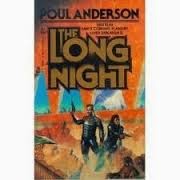As Roan Tom approaches an unknown but habitable planet, he observes many seas but no ocean. The surface of this small terrestroid globe is not covered by a single planetary ocean surrounding several continental land masses but, instead, consists of dry land surrounding many isolated seas. That in itself is quite a thought.
The planet is so small, mass only 0.15 Terran, that it should have neither air nor water. However, this is explained later. Poul Anderson's knowledge of science enabled him to devise mysterious environments for his characters to solve as if in a cosmic detective story.
Tom's most significant statement comes early in his story, "A Tragedy of Errors":
"'I shook pursuit in the Nebula. But when we came out on the other side, we were in a part o' space that wasn't known to us. Old Imperial territory, o' course, but that could mean anything.'"
-Poul Anderson, Flandry's Legacy (New York, 2012), p. 459.
"Old Imperial territory...could mean anything"! Sitting comfortably at home, we feel a sense of freedom and excitement. After the long and enjoyable Flandry period, the Technic History has moved on to an era when old Imperial territory has become unknown and anything can happen. But Poul Anderson knew that the collapse of a civilization is not all freedom and excitement. Tom has already spelt out that life is tough. He and his two wives might not survive and will certainly not get back home unless they can find a planet with enough industrial capacity to repair their ship.

1 comment:
Hi, Paul!
And Roan Tom's comment about how the "Old Imperial territory...could mean anything" shows how small scale interstellar travel had become even for those who still had functional star ships after the fall of the Empire. Space ships had become few and precious and apparently not many were being built in the chaos of the Long Night in the centuries immediately after the Empire fell.
Sean
Post a Comment